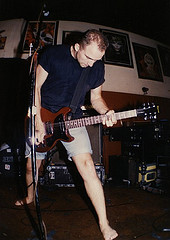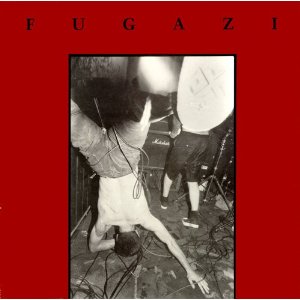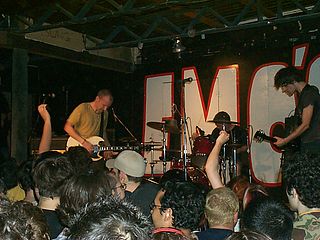
13 Songs is a compilation album by the American post-hardcore band Fugazi, released on September 1, 1989 by Dischord Records. The album consists of all the songs from the band's first two EPs, Fugazi and Margin Walker.

Nurse is the first major label album released by the rock band Therapy? It was released in 1992 on A&M Records.

Rites of Spring was an American punk rock band from Washington, D.C., formed in late 1983. Along with Embrace, and Beefeater, they were one of the mainstay acts of the 1985 Revolution Summer movement which took place within the Washington, D.C. hardcore punk scene.

Embrace is the debut studio album by American post-hardcore band Embrace.
Post-hardcore is a punk rock music genre that maintains the aggression and intensity of hardcore punk but emphasizes a greater degree of creative expression. Like the term "post-punk", the term "post-hardcore" has been applied to a broad constellation of groups. Initially taking inspiration from post-punk and noise rock, post-hardcore began in the 1980s with bands like Hüsker Dü and Minutemen. The genre expanded in the 1980s and 1990s with releases by bands from cities that had established hardcore scenes, such as Fugazi from Washington, D.C. as well as groups such as Big Black, Jawbox, Quicksand, and Shellac that stuck closer to post-hardcore's noise rock roots. Dischord Records became a major nexus of post-hardcore during this period.

Jawbox is an American post-hardcore band from Washington, D.C., formed in 1989 by J. Robbins (vocals/guitar), Kim Coletta (bass), and Adam Wade (drums). After the trio released the album Grippe in 1991, Bill Barbot (guitar/vocals) joined as the fourth member. Jawbox released their second album Novelty in 1992, followed by Wade being replaced by Zach Barocas that same year. Jawbox signed to the major label Atlantic Records and released their third album For Your Own Special Sweetheart in 1994, which spawned the band's most recognizable song "Savory". After the release of their fourth album Jawbox in 1996, the band departed from Atlantic, and subsequently disbanded in 1997. They reunited for a brief one-off show in 2009, followed by a full-time reunion in 2019. Barbot left the band in 2021 and he was replaced by Brooks Harlan.

Washington, D.C., hardcore, commonly referred to as D.C. hardcore, sometimes styled in writing as harDCore, is the hardcore punk scene of Washington, D.C. Emerging in late 1979, it is considered one of the first and most influential punk scenes in the United States.
Fire Party was a band from Washington, D.C. They were together from the autumn of 1986 to the spring of 1990. The band members were Amy Pickering (vocals), Natalie Avery (guitar), Kate Samworth (bass), and Nicky Thomas (drums).
Beefeater was an American post-hardcore band from late 1984 until late 1986. Along with Embrace, Gray Matter, and Rites of Spring, they were one of the mainstay acts of the 1985 Revolution Summer movement which took place within the Washington, D.C. hardcore punk scene.

Novelty is the second studio album by the American post-hardcore band Jawbox, released by Dischord Records in May 1992. The songs "Tongues" and "Ones and Zeros" were previously released as a single, and "Static" was featured on a split 7-inch with Tar. A video was produced for the track "Cutoff."

For Your Own Special Sweetheart is the third album by Washington D.C. post-hardcore band, Jawbox. It was produced by Ted Niceley, best known for his work with Fugazi. This would be the band's major label debut, as they had left Dischord Records to sign with Atlantic Records. It is also the first album to feature Zachary Barocas on drums, as he replaced original drummer Adam Wade two years prior. The album was not much of a commercial success, despite being well received by critics.

Fugazi, also known as the EP 7 Songs, is the debut release by the American post-hardcore band Fugazi. As with subsequent release Margin Walker, Guy Picciotto did not contribute guitar to this record; all guitar was performed by Ian MacKaye. It was originally recorded in June 1988 and released in November 1988 on vinyl and again in 1989 on the compilation release 13 Songs along with the following EP Margin Walker. The photo used for the album cover was taken on June 30, 1988 at Maxwell's in Hoboken, New Jersey.

Margin Walker is the second EP by the American post-hardcore band Fugazi. It was originally released in June 1989 on vinyl and again in the same year on the compilation release 13 Songs along with the debut EP Fugazi. The 12" vinyl went out of print, but was remastered and reissued by Dischord Records in October 2009.

Jawbox is the fourth and most recent album by American post-hardcore band Jawbox. The album was released by TAG Recordings, a subsidiary of Atlantic Records. In the months following the album's release, the band was dropped from TAG and thus from Atlantic.

"Savory" is the first single released by Jawbox from their 1994 major label debut, For Your Own Special Sweetheart. The song is a description of the female body, according to AllMusic, but in a very cryptic form. The three other songs from the single were later included as bonus tracks for the 2009 reissue of For Your Own Special Sweetheart.
Tar was an American post-hardcore band, formed in 1988 in Chicago. Throughout their career they released four studio albums, two extended plays, and a number of singles before breaking up in 1995. They were known for their dry sense of humor.

The discography of Fugazi, an American post-hardcore band, consists of six studio albums, four EPs, a compilation album, a soundtrack album, a demo and a series of hundreds of live recordings. All of the band's releases have been published by Dischord Records, the independent record label co-owned and operated by Fugazi singer and guitarist Ian MacKaye.

You Kill Me is an EP by Canadian punk rock band Nomeansno. Recorded in 1985, it is the first Nomeansno record to feature the band's three-piece lineup, with guitarist Andy Kerr joining founding members Rob Wright and John Wright. Originally issued on the Undergrowth label, it was later re-released on CD with the Sex Mad album on the Sex Mad/You Kill Me compilation CD and cassette released by Alternative Tentacles.

Edsel was an American post-hardcore band from Washington, D.C. who formed in 1988. They released four albums on a yearly basis from 1992 to 1995, which included the Techniques of Speed Hypnosis album on the major label Relativity Records in 1995. They went on a hiatus in 1997, followed by brief reformations from 2000 to 2001 and 2012 to 2013.
Wingtip Sloat is an indie rock trio formed in the Washington, D.C., suburb Falls Church, Virginia. Active throughout the 1990s, the group comprised Patrick Foster on guitar and vocals, Andy Dubuc on bass, and David Bishop on drums. Throughout their initial decade of activity, the group remained committedly DIY, recording and publishing their music themselves while holding down full-time jobs, earning Wingtip Sloat repute as "hardest working band in America."















